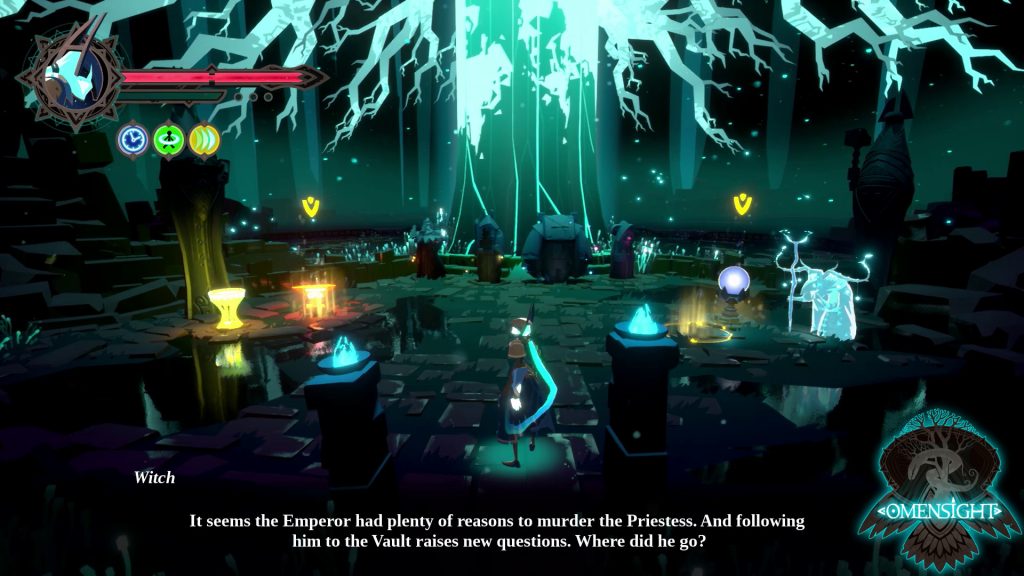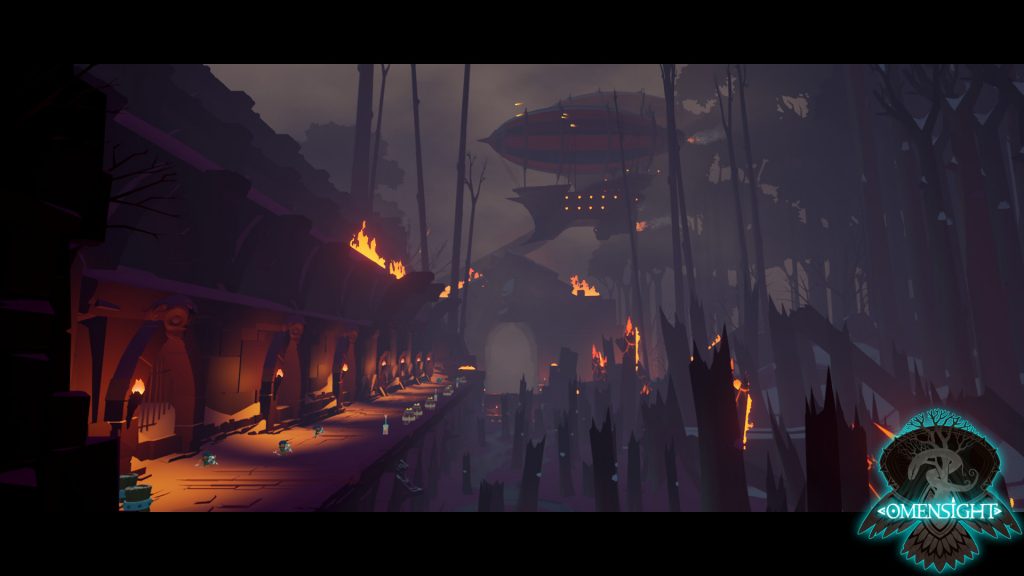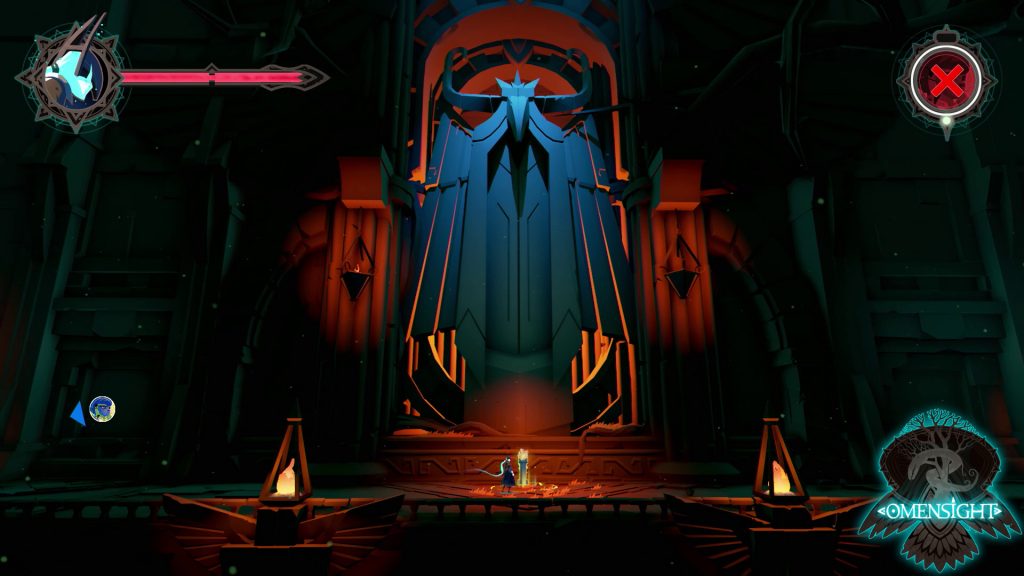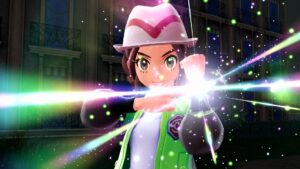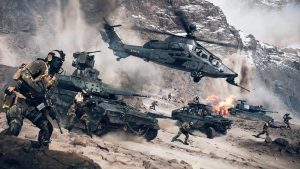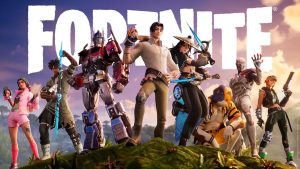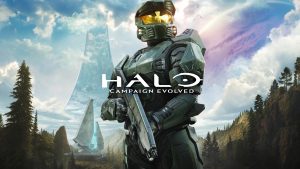
Omensight is the new game from developer Spearhead Games. The studio’s last game was Stories: The Path of Destinies which took a unique approach in exploring storytelling through video games. They’ve taken this even further with the new game as players take on the role of the Harbinger who has to repeat a certain day that led to the destruction of the world.
To learn more about the game, Gamingbolt reached out to Malik Boukhira, Co-founder of Spearhead Games to answer our questions about the game.
"The day progresses in a set way, towards the end of the world, without your intervention. But as soon as you show up, you can start changing things. "
Can you tell us about experiencing the game from different perspectives and how that works as a mechanic?
As the Harbinger, you have to solve the murder of the Godless-Priestess, Vera, because it starts a chain of events that leads to the world ending in the evening of your arrival in the world. Fortunately, in a twist to murder-mystery investigations, you can return to the morning of that last day, and continue your investigation after the world ends. Every time you restart the day, you can make a different decision, choose who you will follow or investigate during the day, which may take you to different locations. An important aspect of the setting of the game is that there is an epic war going on between the Pygarian Empire and the Rodentian clans. You can choose to side with either faction during the day (or betray them and switch side in the middle of the day!) so you will be able to see events from different perspective, and hear of opposite sides of the story. For example, in a version of the day, you may be allied with the rebel leader, Ratika, and see the traps they are planning for the upcoming of attack of the Empire. But on another version, you may have decided to side with Draga, an Imperial General, and actually take part in their assaut. Of course, the knowledge of what the rebels are planning may give you an interesting advantage to tilt the odds on the Empire side…
How do players manipulate time in this game?
On a macro level, you can mess with the timeline of the day, through your actions. The day progresses in a set way, towards the end of the world, without your intervention. But as soon as you show up, you can start changing things. Having characters meet that shouldn’t have, or leading them somewhere they would have never gone, or perhaps killing someone that shouldn’t have died. Killing the Pygarian Emperor is bound to have an impact.
On the gameplay side, you have access to a variety of special powers, some of them affect time. One of them is called Delay of Fate. This power allows you to slow down time in a sphere around you for a few seconds. This is a great power that you can use both defensively and offensively, and also as a tactical window to perform combos with your powers, reposition or even use the environment and traps to your advantage.
What can you tell us about combat in this game and how it works?
The combat in Omensight is easy to pick up, but has a lot of depth to it.
The core of the combat revolves around maintaining a flow of attacks, dodges and counter attacks. We worked very hard to make it as smooth, responsive and impactful as possible.
We wanted the combat to be more that just simple a hack and slash. Over the course of the game, you will unlock a variety of special powers, like Delay of Fate mentioned earlier. Another power is the Phantom Grasp, which allows to telekinetically pull objects or enemies towards you, and them throw them in the direction of your choice.
We designed these powers with two objectives in mind. First, we wanted to introduce tactical tools, including leveraging the environment to your advantage (for example, you can grab a bomb with Phantom Grasp and throw it on a fragile column to cause environmental damage in a wide area). Second, we wanted the powers to interact with one another, in order for you to be creative and pull off all sorts of awesome combos, such as throwing an enemy while he’s slowed down by Delay of Fate and then dash through him, causing damage.
As the Harbinger, you also have an Energy meter, that increases as you maintain your attack flow and not get hit. Once you reach a certain threshold, you can unleash some very powerful abilities, such as a big energy blast. And of course all the abilities can be mixed and matched for some spectacular combos!
Will players engage in dialogue with other characters in the game? Will some of these characters join you as companions?
We have a rather unusual approach to an interactive story game, in that the Harbinger is actually a silent protagonist! That doesn’t mean you can’t interact with other characters, you just do so with action gameplay vocabulary rather than with a separate dialogue system. So you can attack someone, of course, but you can also use you “Omensight” power. This is a unique magical detective power you possess : as you uncover more about the timeline of the murder, you gain a vision of what happened. You can share that vision with other characters, which can be a great interrogation tool, but also influence their actions during the day.
We chose this unusual approach to narrative interaction first because we wanted the story and gameplay to be as seamlessly integrated as possible, and we think action moves have unique properties of their own narratively, and don’t need the support of a dialogue system. But the most important reason is because we want YOU the player, to be the real lead of the investigation, and make decisions based on your own reflexions and observations, and not that of a character named Harbinger. If we had given the Harbinger a voice and an elaborate personality, then each time you would make a decision, the Harbinger would have needed a reason and a reaction, and that’s not something we want to impose. After all, you can make the same decision, but have many reasons why. You may decide to follow a character because you think they are suspect, or because you need their help to defeat another character you think is guilty. Both reasons can actually be valid and induce the same action.
And yes, several characters can join as companions, depending on your decisions. You’ll actually spend a lot of time in the game, with a companion or another, depending on your decisions. You may follow a companion for many reasons : perhaps you think they are suspects and you want to see what they’re up to, or perhaps you simply think they can lead you to certain location. Those companions can be from either faction, which can affect what areas of the world you can access, but also who are your allies and enemies. In addition to the contribution of these characters to the story, each one of them has unique properties and abilities. For example, Ludomir, a rebel hero, is very strong and combat focused. Upon your command, he can perform a powerful shockwave attack that will damage and knock down enemies in a wide area around you. Ratika, the rebel boss, is bard and a surprisingly powerful mage. On top of her magical missile attacks, she can also play the Hero’s Song, which will make you super fast and strong for a few seconds.
Telling unique stories through games is something you explored with Stories: The Path of Destinies as well. Has your experience with Stories helped in making Omensight?
Going through Stories allowed to learn a lot about interactive storytelling, and how to approach narrative in action games. After we were done with the game, we felt we still had a lot to explore and experiment with that narrative form.
In Stories, we built a narrative structure that was about embracing the fun of narrative exploration, seeing many varied outcome of a story, based on a series of decisions (you don’t have to reload the game to see the “what if” of your choice, it’s part of the game to do so!). With this approach, we also learned a lot about creating meaningful choices and consequences for our players, as no single choice led to the same outcome as another choice, and we had to make sure that each outcome would be as unique and satisfying as possible.
We kept all that learning in Omensight, and insured that our choices had meaningful (and that no choice would lead to the same outcome!), varied and interesting consequences. But the next step we wanted to push forward is to make interactive story into more than exploration or flavor, and make it much more meaningful in a video game : basically turn narrative into a gameplay. That is how we started working towards a murder mystery, as it is basically a narrative puzzle. Sure it’s still fun to see the different outcomes of your choices, but now you have stakes. What’s particularly interesting is that, with this approach, dialogues are more than just story, they are potential clues that help you solve the puzzle, so you have to pay attention to the story in a very particular, video game way!
The game’s art style really stands out as being expressive and distinctive. Would you say smaller games like this are forced to experiment with interesting art styles?
I wouldn’t say forced, but definitely strongly driven to that. The thing with realistic art style, especially for a heavy narrative game like ours, is that if you go for it, you have to go all the way, because it’s very easy to fall in the uncanny valley. If it’s a bit off, it’s much more obvious and will impact much more negatively the experience. We definitely can’t afford motion capture and fancy facial animation. So instead, we go with stylized and more expressive art style. It’s actually harder from an artistic point of view. You can’t just copy a photo or capture movement to get a cool result, you need to have a strong artistic eye. But the big benefit is that you can convey a lot with the right colors, shapes and symbols. Atmospheres, emotions, etc. Our choice to use anthropomorphic animals as characters is along those same line. Animals and their stylized silhouettes are expressive at a fundamental level. You can expect a big bear character to be strong and impulsive, or a rat character to be sneaky, you don’t need to give them super fancy details and acting to convey those traits.
"Well, creating a narrative puzzle is quite a challenge, because you need to master both creative writing (making the dialogues and stories compelling) and game design (making the puzzle gameplay fun!) simultaneously."
Were there any particular challenges you faced during the game’s development?
Well, creating a narrative puzzle is quite a challenge, because you need to master both creative writing (making the dialogues and stories compelling) and game design (making the puzzle gameplay fun!) simultaneously. That’s not a very common skillset.
Fortunately, we had a great design and writer team, including legendary Chris Avellone (Fallout, Planescape:Torment, etc.) helping out!
The game is now confirmed for the PS, which also means it will support the PS4 Pro. Can you please let us know the resolution and frame rate it will run at on the PS4 Pro?
We’re not done with the PS4 development, but right now the game can run in 4K at an average of 40fps.
Currently, our bottleneck is not the graphics, but rather all the AI running at the same time. We can have a lot of NPCs jumping around or fighting at the same time, with your companions, allied soldiers and enemies. There’s a war going on after all.
And the resolution and frame rate on the base PS4 version?
Currently, it runs at 1080p at an average of 40fps.
Given that you are now working on both the PS4 Pro and PC, what kind of technical differences did you found between the two?
We work with Unreal Engine 4, and there were no technical difficulties that were not already handled by UE4.
Mark Cerny, the lead engineer of the PlayStation 4 Pro claimed that converting a base PS4 game to PS4 Pro version is just 0.2 Or 0.3% of the overall effort. What is your take on this? Do you think that the extra work required to develop an additional Pro version will actually be bigger than the number quoted?
For us, it might be even less than 0.2% of the effort. We only needed to add a small function here and there.
"Despite what certain people may have said, I don’t believe single player games are dead. At least I hope not, since Omensight is an exclusively single player experience!"
Sony have included an advanced work distributor in PS4 Pro along with new Polaris features like Delta color compression. What is your take on these features and do you have plans to take advantage of them?
We have not taken advantage of these features. Hopefully UE4 can do this under the hood.
Is there a specific reason why you are not launching your game on the Xbox One?
First because we’re a small team, so we can’t launch on too many platforms at the same time, as each requires it’s own work in terms of optimization and other technical requirements. Second, as we never shipped a game on Xbox yet, so going with PS4 was the smoothest and most efficient for us.
Any chance of a Nintendo Switch version?
There is :). We’re definitely looking into it, but as a small team of 15, we can’t tackle too many platforms at the same time.
What is your take on the recent trend of Games as a service model and the possible controversial monetization practices arising from it?
Despite what certain people may have said, I don’t believe single player games are dead. At least I hope not, since Omensight is an exclusively single player experience!! (and stapling multiplayer or microtransactions on it would definitely make the experience worse). However, I do think that a Games as a service model can be great for certain games. After all, as a player, isn’t it great if your favorite game gets constant updates and new content?
I do see how certain big publishers are banking on it. After all, a long term, predictable, constant stream of revenue from a product sounds great, and I can definitely imagine EA or Activision Execs drooling at that prospect. The problem is indeed how it is monetized. I think the monetization aspect has to be done respectfully and responsibly towards the players. Pay to win is not much fun in competitive games, but I have no doubt some free-to-play developers would attempt the trick, as “performance” is a very attractive thing to sell. Also, an overuse of gambling mechanics is a cheap way of abusing flaws in the human brain, and potentially exploit vulnerable people. So, overall, I think there’s definitely a place for Games as a service because it can be great for the players, provided it is done right and not exploitatively.
The current generation of consoles will probably end in the next couple of years. What is your biggest expectation from the next PlayStation and Xbox?
Better performance is always good because it opens more possibilities for the games we create. That being said, as a developer, I would love to see some improvements in the way games are promoted and presented in the stores of theses platforms. Right now, discoverability or exposure on a platform like PSN is pretty bad.
Besides that, I wonder if we won’t see a breakthrough in streamed games, or subscription based models, as a mainstream way to consume games on consoles.
From a developer perspective, do you think the next-gen console era will be the 4K/60fps era?
Why not? I think we now have the hardware to achieve that at a reasonable cost.
Is there anything more you’d like to tell our readers?
Thanks for reading this! We’re a small team of passionate developers who try to push the boundaries of what’s possible, and we hope you enjoy the experiences we create! Don’t hesitate to Wishlist Omensight on Steam, to help us out a bit!








